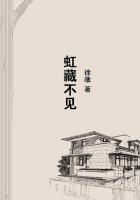as if the same characters carelessly neglected their own estates, and lived by injustice and rapine from others. For it is not as the physicians say of oil, that, outwardly applied, it is very wholesome, but taken inwardly detrimental, that thus a just man provides carefully for others, and is heedless of himself and his own affairs; but in this Aristides's political virtues seem to be defective; since, according to most authors, he took no care to leave his daughters a portion, or himself enough to defray his funeral charges: whereas Cato's family produced senators and generals to the fourth generation; his grandchildren, and their children, came to the highest preferments. But Aristides, who was the principal man of Greece, through extreme poverty reduced some of his to get their living by jugglers' tricks, others, for want, to hold out their hands for public alms; leaving none means to perform any noble action, or worthy his dignity.
Yet why should this needs follow? since poverty is dishonourable not in itself, but when it is a proof of laziness, intemperance, luxury, and carelessness whereas in a person that is temperate, industrious, just, and valiant, and who uses all his virtues for the public good, it shows a great and lofty mind. For he has no time for great matters who concerns himself with petty ones; nor can he relieve many needs of others, who himself has many needs of his own. What most of all enables a man to serve the public is not wealth, but content and independence; which, requiring no superfluity at home, distracts not the mind from the common good. God alone is entirely exempt from all want: of human virtues, that which needs least is the most absolute and most divine. For as a body bred to a good habit requires nothing exquisite either in clothes or food, so a sound man and a sound household keep themselves up with a small matter. Riches ought to be proportioned to the use we have of them; for he that scrapes together a great deal, ****** use of but little, is not independent; for if he wants them not, it is folly in him to make provision for things which he does not desire; or if he does desire them, and restrains his enjoyment out of sordidness, he is miserable. I would fain know of Cato himself, if we seek riches that we may enjoy them, why is he proud of having a great deal, and being contented with little? But if it be noble, as it is, to feed on coarse bread, and drink the same wine with our hinds, and not to covet purple, and plastered houses, neither Aristides, nor Epaminondas, nor Manius Curius, nor Caius Fabricius wanted necessaries, who took no pains to get those things whose use they approved not. For it was not worth the while of a man who esteemed turnips a most delicate food, and who boiled them himself, whilst his wife made bread, to brag so often of a halfpenny, and write a book to show how a man may soonest grow rich; the very good of being contented with little is because it cuts off at once the desire and the anxiety for superfluities. Hence Aristides, it is told, said, on the trial of Callias, that it was for them to blush at poverty who were poor against their wills; they who like him were willingly so might glory in it. For it is ridiculous to think Aristides's neediness imputable to his sloth, who might fairly enough by the spoil of one barbarian, or seizing one tent, have become wealthy. But enough of this.
Cato's expeditions added no great matter to the Roman empire, which already was so great, as that in a manner it could receive no addition; but those of Aristides are the noblest, most splendid, and distinguished actions the Grecians ever did, the battles at Marathon, Salamis, and Plataea. Nor indeed is Antiochus, nor the destruction of the walls of the Spanish towns, to be compared with Xerxes, and the destruction by sea and land of so many myriads of enemies; in all of which noble exploits Aristides yielded to none, though he left the glory and the laurels, like the wealth and money, to those who needed and thirsted more greedily after them: because he was superior to those also. I do not blame Cato for perpetually boasting and preferring himself before all others, though in one of his orations he says that it is equally absurd to praise and dispraise one's self: yet he who does not so much as desire others' praises, seems to me more perfectly virtuous, than he who is always extolling himself. A mind free from ambition is a main help to political gentleness; ambition, on the contrary, is hard-hearted, and the greatest fomenter of envy; from which Aristides was wholly exempt;Cato very subject to it. Aristides assisted Themistocles in matters of highest importance, and, as his subordinate officer, in a manner raised Athens: Cato, by opposing Scipio, almost broke and defeated his expedition against the Carthaginians, in which he overthrew Hannibal, who till then was even invincible; and, at last, by continually raising suspicions and calumnies against him, he chased him from the city, and inflicted a disgraceful sentence on his brother for robbing the state.
Finally, that temperance which Cato always highly cried up, Aristides preserved truly pure and untainted. But Cato's marriage, unbecoming his dignity and age, is a considerable disparagement, in this respect, to his character. For it was not decent for him at that age to bring home to his son and his wife a young woman, the daughter of a common paid clerk in the public service: but whether it were for his own gratification or out of anger at his son, both the fact and the pretence were unworthy. For the reason he pretended to his son was false: for if he desired to get more as worthy children, he ought to have married a well-born wife; not to have contented himself, so long as it was unnoticed, with a woman to whom he was not married; and, when it was discovered, he ought not to have chosen such a father-in-law as was easiest to be got, instead of one whose affinity might be honourable to him.
THE END
75 AD
CAIUS GRACCHUS
153-121 B.C.















